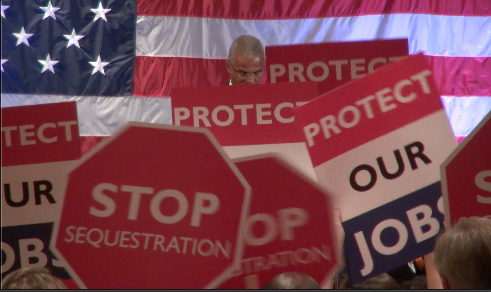WASHINGTON – With looming across-the-board budget cuts slated to begin in January, defense industry leaders warned Monday of deep wounds to America’s backbone if Congress fails to act to avoid the roughly $1 trillion in reductions.
At a rally in Crystal City, Va., several Northern Virginia-based defense contractors said besides costing millions of American jobs, the mandatory cuts, known as sequestration, ripple across the entire economy.
More than 200 people, many employed by the contractors, attended the event.
Wes Bush, CEO of the leading unmanned aircraft manufacturer Northrop Grumman Corp., said sequestration could hurt both the nation’s defense and non-defense sectors by causing massive layoffs in such key positions as air traffic controllers and government inspectors.
According to a recent study by the Aerospace Industries Association, which represents major U.S. aerospace and defense companies, sequestration could cost more than 2.1 million jobs nationwide and drive up the unemployment rate by up to 1.5 percent.
“It is an irrational approach to the solve our budget problem and will have negative impacts in the long term,” said Bush, “It damages our ability to attract and maintain the brightest minds in aerospace and defense industries.”
Contractors also made the case for veterans’ jobs. “All the debate about the budget cuts gets very personal because it affects real people,” said John Jumper, CEO of Science Applications International Corporation (SAIC). Jumper said 10,000 out of 40,000 SAIC employees are veterans, many with disabilities. The company, he said, hires 1,000 new veterans each year.
Jumper said sequestration could curb the company’s research and development projects, one of which is aimed at discovering where improvised explosive devices are so troops can avoid them.
“Sequestration will certainly impact the innovation pipeline,” echoed Brad Antle, the CEO of Salient Federal Solutions, a technology company that works with the military. “It will damage our nation’s ability to compete.”
Salient hires 1,100 employees that provide information technology and engineering services to the government. The mid-size technology company, Antle said, is more vulnerable to cuts than it’s much-larger counterparts.
Fairfax County Chamber of Commerce President Jim Corcoran said he understands the necessity of making budget cuts, but insisted that such reductions should not “jump on the back of the defense industry”.
“Many of these companies aren’t household names that you know or you see on newspaper,” said Corcoran, “yet these companies employ hundreds of thousands of people in Virginia and millions across the country. They are going to be affected.”
If Congress reaches no conclusion on the specifics of sequestration before the lame duck session, the across-the-board cuts go into effect in January. Leaders from both parties are calling for a consensus.
“It is difficult to find a solution but there is a solution,” said Rep. Frank Wolf, R-Va., “This is what you do as a family. We need to come together in a bipartisan way and put everything on the table.”
“For the sake of the country, can we not come together and get something done for the American people?” added Rep. Gerry Connolly, D-Va., “This is not rocket science.”

